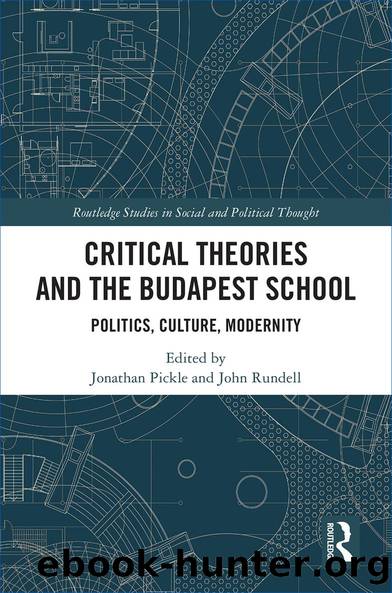Critical Theories and the Budapest School by John Rundell Jonathan Pickle

Author:John Rundell, Jonathan Pickle [John Rundell, Jonathan Pickle]
Language: eng
Format: epub
ISBN: 9781138203020
Barnesnoble:
Publisher: Taylor & Francis
Published: 2017-12-07T00:00:00+00:00
The âpolitics to comeâ and Foucaultâs resistance
Agambenâs radical diagnosis of Western modernity and his messianic emancipatory vision exemplify the contemporary biopolitical vision. Its key elements are a radical critique of the Western tradition of political philosophy and its central political and economic institutional instantiations as well as an uncompromising, messianic alternative in the shape of the indistinct âpolitics to comeâ. Of course, some aspects of this biopolitical vision stem solely from Agambenâs own political inspiration and its distinctively radical Italian sources.5 However, others are already present in Foucault and his contemporaries, like Miguel Vatter. Foucaultâs thought may be too sceptical to tolerate the sort of apocalypticism that is expressed in Agambenâs largely gestural politics. However, this radicalism is still evident in Foucault, even if in his work, it assumed a somewhat different form.
To illuminate this difference, we need only turn to Foucaultâs account of resistance. On his reading, social relations are permeated by ubiquitous power, and this decentred power finds its own inverse energy in a similarly dispersed resistance. The key to this conception of power and its inherent relationality is that neither power nor resistance can be fundamental or substance. While Foucault affirms the existence and inevitability of resistance, his account is troubling. On the one hand, his empirical resisters are obvious: the oppressed and downtrodden in a variety of well-known empirical shapes â the mad; the prisoner; the homosexual; women; various Third World communities that provided the specific occasions, contexts, and inspirations for his works. But beyond these concrete oppressed actors, resistance and revolt are, in Foucault, merely the other of power: limit concepts. So, the status of âresistanceâ and ârevoltâ in Foucaultâs work seems to be that of either a theoretical postulate or an inexplicable brute fact. Sceptical of humanism and viewing it as the embodiment of a normatively oppressive unified subject, resistance constitutes its âotherâ, with which it is locked in a perpetual contest. Thus, what we have is a sort of âresidual humanismâ: every bit as essentialist as those he critiques in the Western tradition.
Yet sometimes, this alternative can take flight, as in his account of the Iranian revolution. Foucault went to Iran twice in 1978, both immediately before the revolution and then soon after to report on the uprising against the Shah. There, he finds real confirmation of his ideas on resistance, âof the timeless drama in which power is always accursedâ and of the fact that the modern understanding of revolution, which rationalised it into a lawful and controllable history, was, in fact, the colonisation of an inexplicable and, therefore, truly historical event by Realpolitik (Afary and Anderson, 2005). Foucault divides the Iranian revolution into two realities. Most important to him is the revolt itself. Here is manifest the beauty of a collective will that is, for him, bent not just on a change of regime but on radically changing itself and its relations to things, others, eternity, and God. This is the process of self-transformation that he speaks of in relation to the Enlightenment but in a less conscious form.
Download
This site does not store any files on its server. We only index and link to content provided by other sites. Please contact the content providers to delete copyright contents if any and email us, we'll remove relevant links or contents immediately.
Cecilia; Or, Memoirs of an Heiress — Volume 1 by Fanny Burney(32544)
Cecilia; Or, Memoirs of an Heiress — Volume 2 by Fanny Burney(31939)
Cecilia; Or, Memoirs of an Heiress — Volume 3 by Fanny Burney(31928)
The Great Music City by Andrea Baker(31915)
We're Going to Need More Wine by Gabrielle Union(19033)
All the Missing Girls by Megan Miranda(15937)
Pimp by Iceberg Slim(14481)
Bombshells: Glamour Girls of a Lifetime by Sullivan Steve(14049)
For the Love of Europe by Rick Steves(13890)
Talking to Strangers by Malcolm Gladwell(13344)
Norse Mythology by Gaiman Neil(13343)
Fifty Shades Freed by E L James(13231)
Mindhunter: Inside the FBI's Elite Serial Crime Unit by John E. Douglas & Mark Olshaker(9315)
Crazy Rich Asians by Kevin Kwan(9274)
The Lost Art of Listening by Michael P. Nichols(7487)
Enlightenment Now: The Case for Reason, Science, Humanism, and Progress by Steven Pinker(7305)
The Four Agreements by Don Miguel Ruiz(6744)
Bad Blood by John Carreyrou(6610)
Weapons of Math Destruction by Cathy O'Neil(6263)
